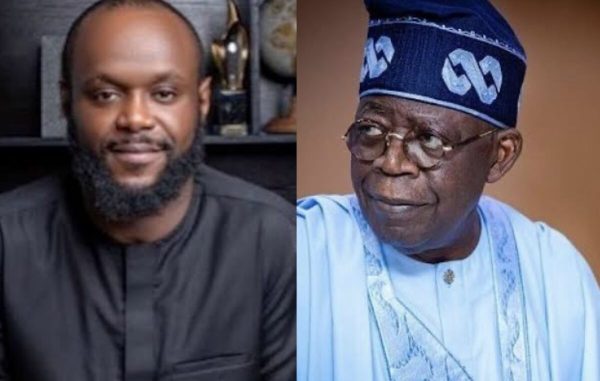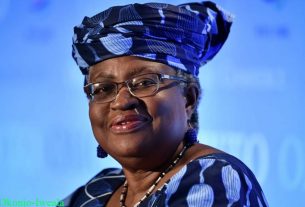Seyi Tinubu and Father, President Bola Tinubu. Photo:Peoples Gazette
That there is no specific law against the misuse of the presidential aircraft by persons other than the president does not at all excuse its frivolous use as Seyi Tinubu clearly did. An indignant commentator is quoted to say that “even if our laws are vague on this, one thing is clear: this is an offence to the moral code of leadership.” He is right.
Lawyer Jiti Ogunye asked: “For example, will it be permissible for children of the president to be moving around [in] the presidential limousines or cars? That will not be permissible due to security implications and for the dignity of that office.” In any case, no state in the world can make enough laws to take care of every human behaviour. There is the letter of the law and there is the spirit of the law. And U.S. Supreme Court judge, Earl Warren, is reported to have said, it is the spirit, not the form that keeps justice alive.
Whereas what is not specifically legislated against may be permissible, it may be argued that any act that can be reasonably construed as morally reprehensible must, ipso facto, run against the spirit of the law. The Constitution and other laws are human made documents that, as said earlier, cannot capture, address, and legislate on the details, shades, and nuances of human virtue and vices. Nonetheless, the implicit demand of leadership is that everyone in such a position must bring both the letter and the spirit of the law to bear on their respective remits. A commentator said “it is essential for leaders to uphold ethical standards and set a good example for the public. Transparency and adherence to rules can help combat corruption and ensure that government resources are used responsibly.” Again, character and honour have much to do with this.
In the United States from where many of the appurtenances of power are copied in the Nigerian democratic system of government, frivolous use of state resources by even the president is not encouraged. For example, it is reported that a sitting president on a re-election campaign must share the cost of using the presidential jet with his political party and ‘reimbursements are generally reported to the Federal Election Commission…’ It is even said that press men, who travel with the American President in Air Force One, are paid for by their media organisations that are charged ‘for a First Class ticket at a rate determined by averaging the same ticket on 3 commercial carriers’. Furthermore, even people who don’t have to pay for their seats ‘still have to pay for their meals.
At a time that there are calls to reduce the size of the 10-plane presidential fleet because the Nigerian economy cannot sustain it, that Nigeria is to spend at least 60 per cent of its federal budget to service debt, that despite a 121 per cent budget increase under President Buhari, the country is perennially indebted to foreign service providers to the presidential fleet because ‘for successive years, the fleet has been grossly underfunded [and these debts are carried forward into the next budget year]’; at a time when, up to 60 per cent of Nigerians are said to live in ‘multidimensional poverty’, and the country is, in the words of Falana, said ‘to be the headquarters of the greatest number of poverty-stricken people in the world [and] cannot afford to waste billions of Naira on the use of presidential aircraft’, the Presidency and the Legislature are literally ‘living it up’ to the face of the people. It is unconscionable. If the leaders of a country can be so wasteful with its resources, pray, what foreign creditor and investor will be eager to do business with that country?
Indeed, the sharp cut from the N15.5 billion requested to N8.072 billion approved by the National Assembly for the presidential fleet in the 2023 budget may now be understood and justifiable. Whereas the fleet commander complained that the approved amount was inadequate, clearly, no responsible authority will allocate scarce public funds for children of the high public officials engaged in frivolous trips. In this connection, the federal legislature is hereby called upon to make clear law on who can use the presidential plane and other paraphernalia of presidential office, for what specific purpose, and for what duration of time.
All said, it all boils down to the issue of that nearly overused ‘cost of governance’. In 2015, the All Progressives Congress (APC) government under Buhari promised to reduce this in order to free resources for development projects. His eight years was characterised by, without mincing words, an unconscionable waste of lives and resources: it was a ‘governance disaster’. The electorate, in its wisdom, returned the party with the expectation that a different head of government will do things differently and better. Tinubu’s 80-page Action Plan for a Better Nigeria promises to ‘streamline the amount that the government spends on itself…[and] will adhere strictly to the principle that public funds are only to be spent on public good and we shall strive earnestly to reduce the overall cost of the Federal Government’. So far, there is little to show that this president is operating according to his working document.
In a somewhat indirect reference to Seyi Tinubu’s father, a commentator wrote, “Our leaders must do more than just occupy an office; they must uphold its dignity”. To a president who said he was well prepared for the exalted office he now holds, we are constrained to remind him that effective (and successful) leadership begins first, from its stand on the moral high ground of character, integrity, and trustworthiness and second, leading by practical example.
The Guardian





